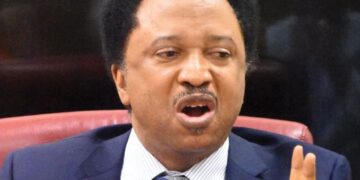Imo State Governor, Hope Uzodimma, has advocated smarter integration of African air assets into a collective security architecture to further contain challenges emerging from evolving transborder threats.
Mr Uzodimma said this on Friday at the closing ceremony of the Fourth African Air Forces Forum which started on Thursday and ended on Friday at Eko Hotel and Suites, Victoria Island, Lagos State.
The governor said that air power remained one of the most versatile tools of modern defence offering speed, reach, database and intelligence superiority.
He said, “Across Africa, we are presently being confronted by the complexity of trans boundary threats from terrorism to banditry, cyber incursions to resources-based conflicts. Air space defines sovereignty; it also shapes a nation’s survival. Models or guidelines do not contain these challenges, and the threats continue to evolve. So, our responses must be in actionable precision and collaborative efforts.’’
Mr Uzodimma said that African nations had built impressive capabilities citing Egypt as an example with over 1,000 aircrafts, Algeria, over 600 aircrafts and Nigeria with 63 aircrafts.
“However, these numbers alone are insufficient, we do not need only more aircrafts but smarter integration of our air assets into a collective security architecture,” he said.
The governor said that collaborative efforts could not be overemphasised towards fighting threats, highlighting the Multinational Joint Task Force (MJTF) established by the Lake Chad Commission as a good example of such collaboration.
“MJTF was established in 2014 by the Lake Chad Commission in response to the threat of Boko Haram around our sub region. Nigeria, Republic of Benin, Cameroun, Chad and Niger made up the joint task force and through their joint operations, we have achieved gains in our efforts to secure our countries. We have neutralised terrorists’ strongholds, restored communities and enabled safe resettlement,” he said.
Mr Uzodimma, however, said that more needed to be done in terms of operational interoperability and shared logistics which must be addressed not in theory but through mechanisms which would be built together.
He said that Africa remained largely dependent on external suppliers for critical aerospace and defence needs, noting that some impressive developments were already taking place in Africa.
“This reliance leaves us vulnerable to both market volatility and strategic manipulations, yet across the continent, signs of transformation are emerging. The Nigerian Defence Industry Corporation is producing small arms and experimenting with advanced platforms. Some private firms are manufacturing world-class mine resistant protected vehicles which have already been deployed to countries such as Chad, Niger and Rwanda,” the governor said.
Mr Uzodimma said that South Africa had doubled its defence exports since 2020 supplying advanced systems and warfare equipment.
“Morocco has become a trusted aerospace manufacturing hub producing airbus and other global revolutionary equipment manufacturers. Egypt and Algeria maintain matured domestic defence industries while Ethiopia and Zambia are well known for self-sufficiency and technology integration,” he said.
The governor said that over $25 billion had been spent in Algeria, $13.4 billion in Morocco and $3.1 billion in Nigeria towards improving the defence architecture of their countries.
He stated, “It shows that we are willing to invest however, we must align these investments with coherent goals such as technology transfer, indigenous innovation and world class development. South Africa and Morocco have shown more aerospace progress, economic growth and job creation, which we must take a cue from.’’
Mr Uzodimma also said that the leadership of the NAF had adopted a self-reliant approach by renovating more abandoned aircrafts, deploying totally developed Unmanned Aerial Vehicles (UAVs) and incorporating academic research into nation planning and system designs.
“This shift is amplifying the scope of African led innovation in defence, and I commend the Chief of Air Staff, Air Marshal Hasan Abubakar for this innovative shift that he has brought today. This forum now bears a new doctrine, an African aerospace doctrine, one that is rooted in total capacity, governed by shared standards and fuelled by political commitments. I urge this distinguished body and participants to move from principles to policies. Africa’s skies must not remain unprotected and African solutions can no longer wait,” the governor said.
(NAN)












































Discussion about this post